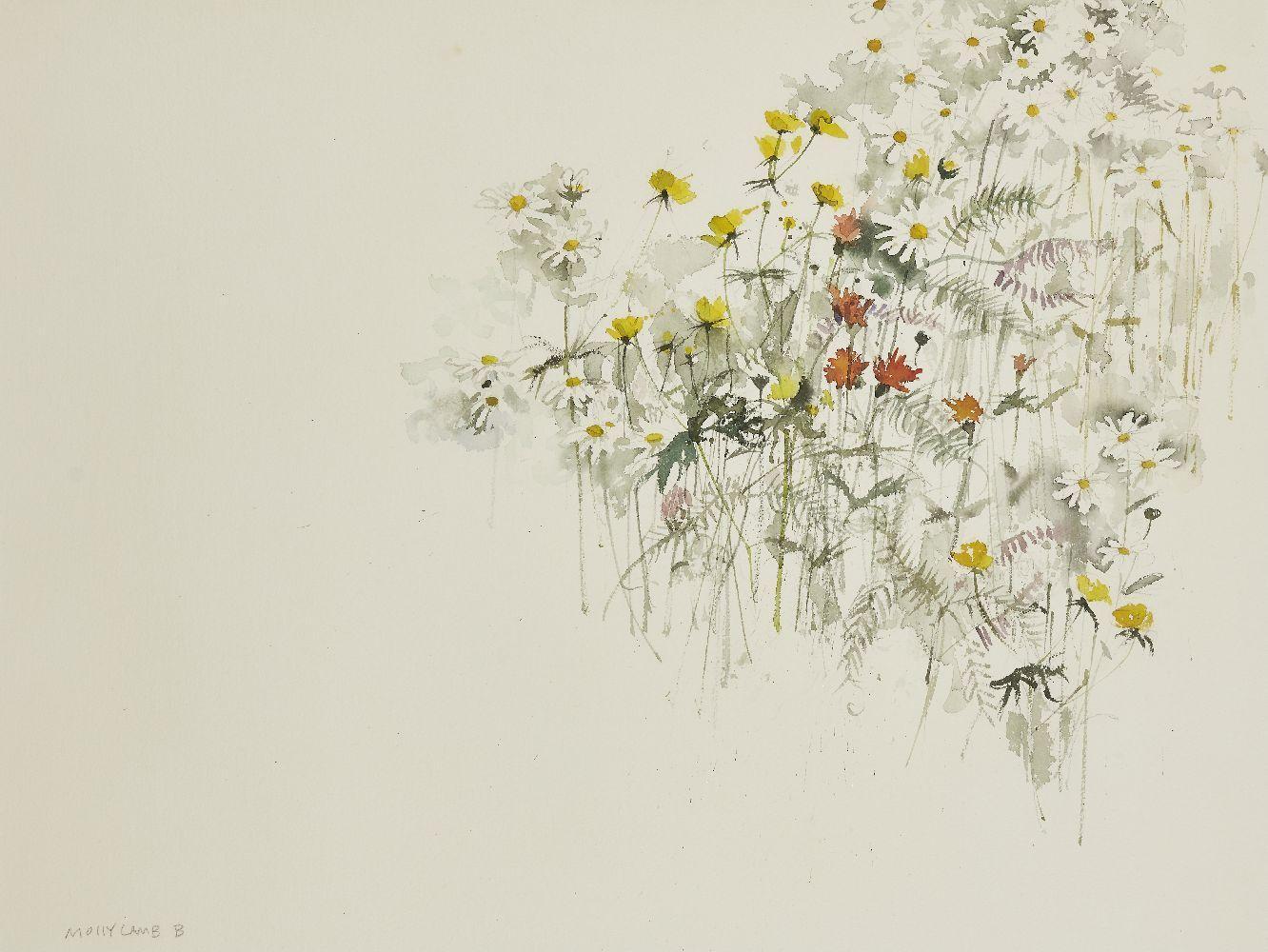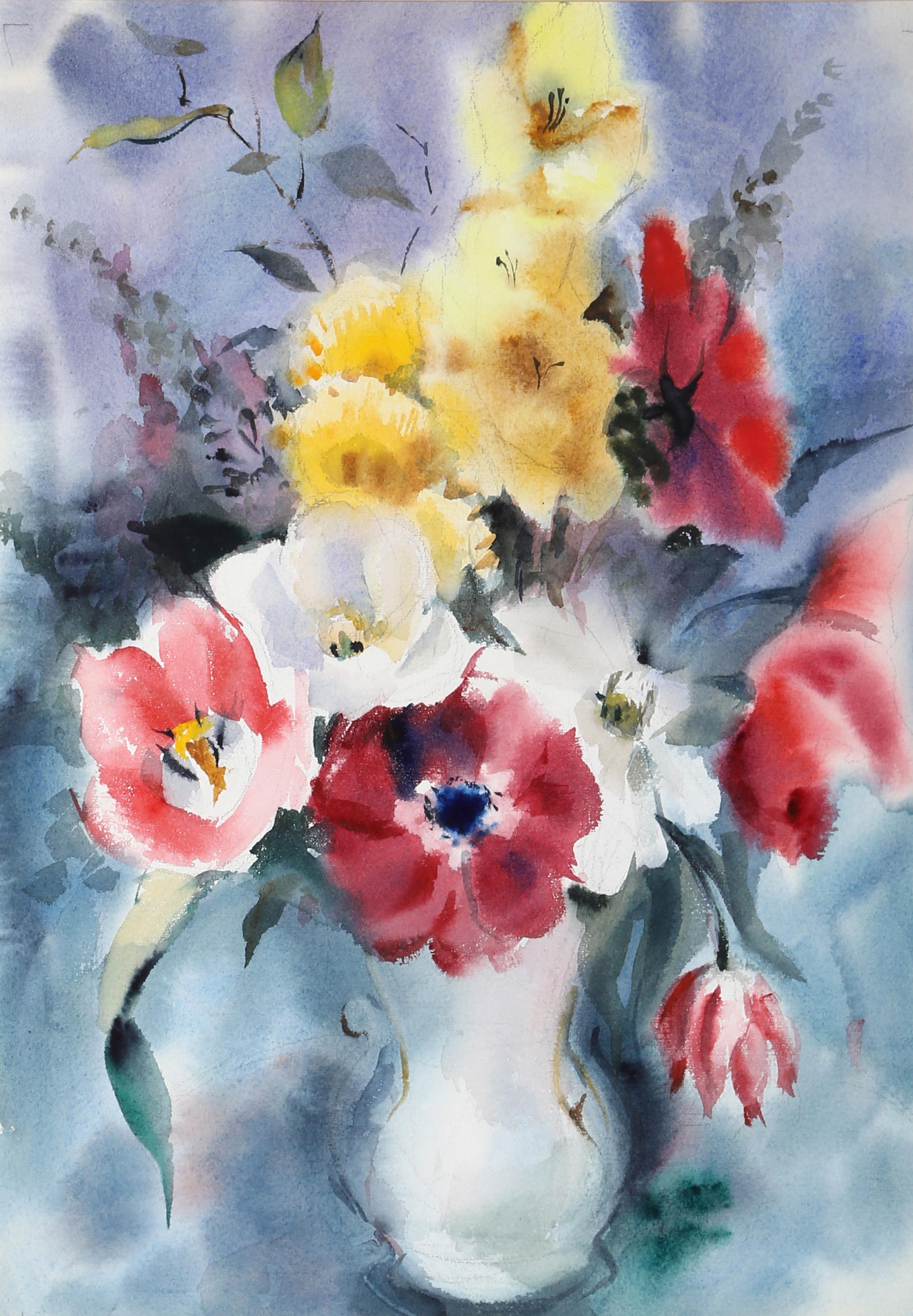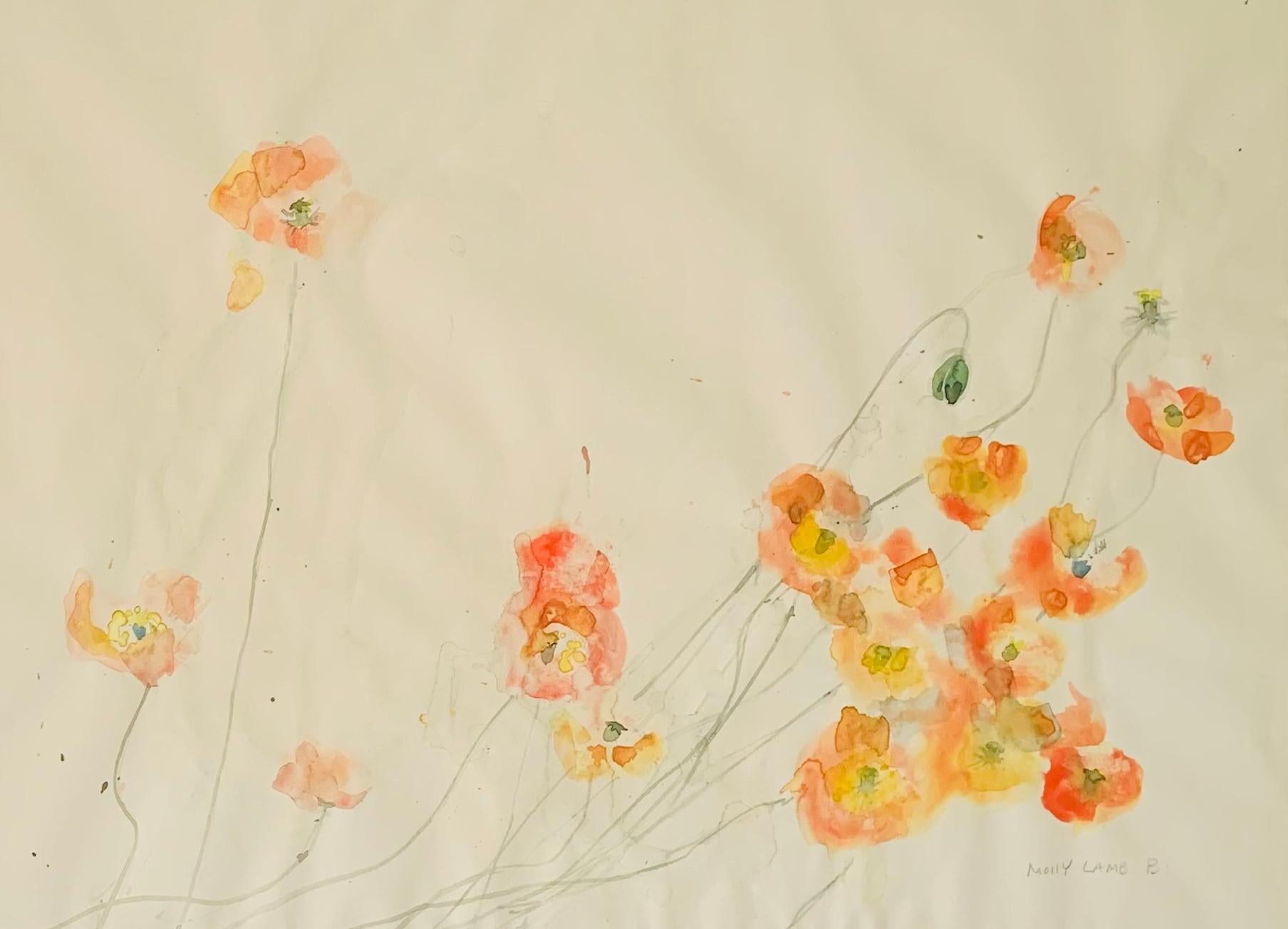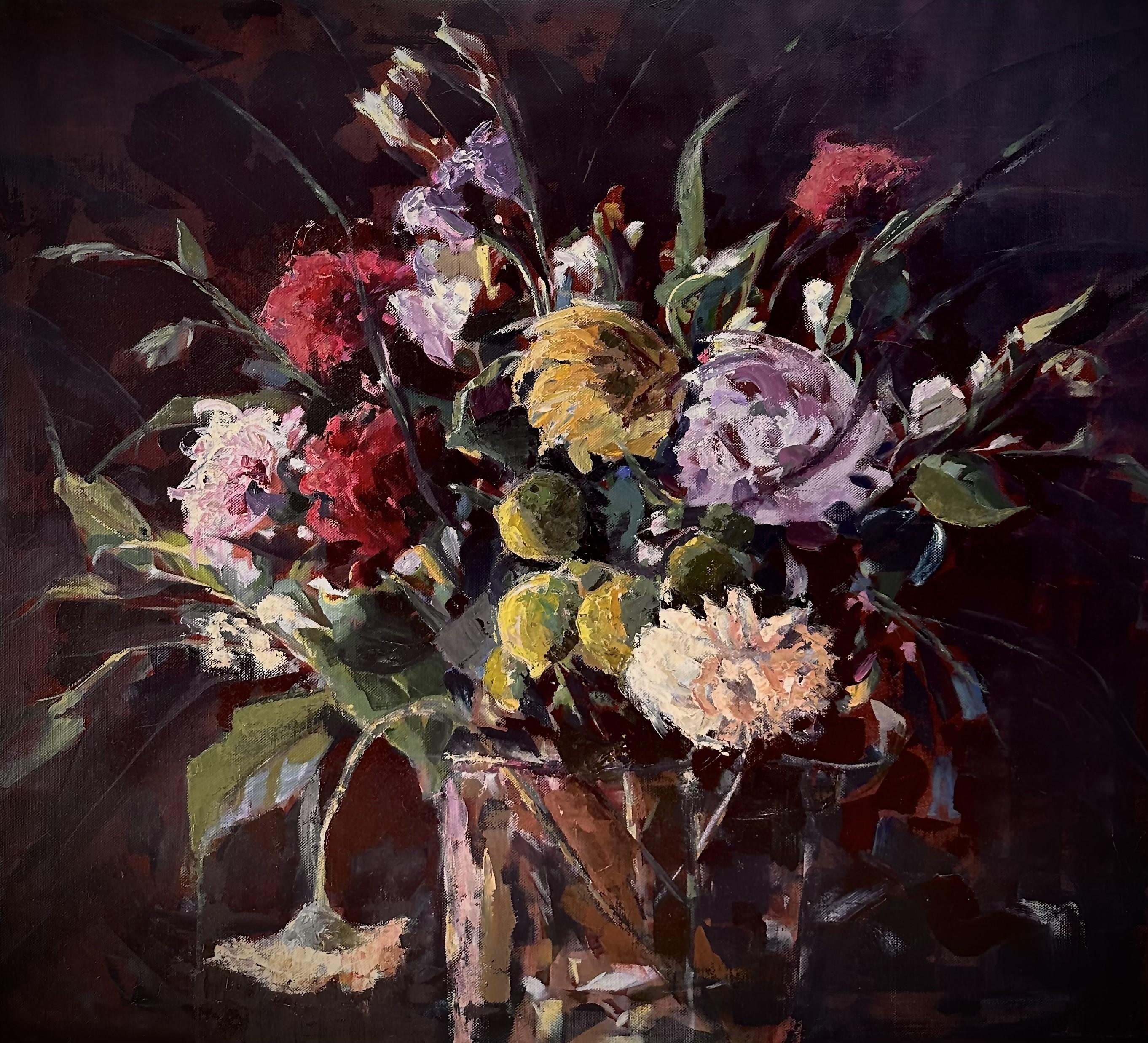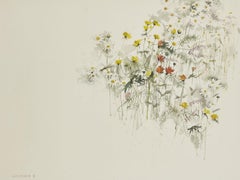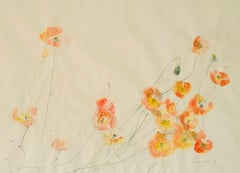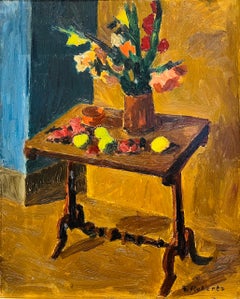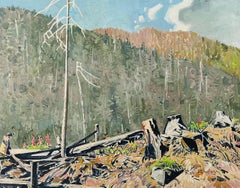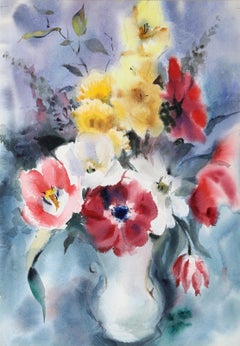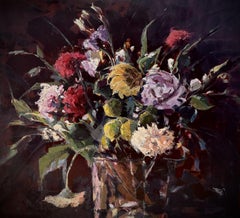Items Similar to Bouquet
Want more images or videos?
Request additional images or videos from the seller
1 of 7
Molly Lamb BobakBouquet
$1,800
£1,362.14
€1,570.97
CA$2,513.58
A$2,816.02
CHF 1,465.73
MX$34,293.69
NOK 18,671.50
SEK 17,583.28
DKK 11,727.09
Shipping
Retrieving quote...The 1stDibs Promise:
Authenticity Guarantee,
Money-Back Guarantee,
24-Hour Cancellation
About the Item
Molly Lamb Bobak, Canadian, 1920 – 2014
Bouquet
Watercolour
18 x 24 in
signed
framed
Molly Bobak Biography
(1922 - 2014) RCA
It could be said that Molly Lamb Bobak was destined to be an artist. She was born on Lulu Island, near Vancouver, British Columbia, on February 25, 1920. She grew up in a bohemian enclave. Her father, Harold Mortimer Lamb, was a photographer and art critic. In 1926, her father opened a commercial art gallery in Vancouver, exhibiting painters, sculptors, and photographers.
In 1938, Bobak attended art school at the Vancouver School of Art and studied under Jack Shadbolt, where she learned to improve her drawing and composition skills. While working at the Yellow Point Lodge during the summer of 1940, Lamb kept a diary filled with text and caricatures and drew everyone that she encountered. Bobak joined the Canadian Women’s Army Corps in 1942. While serving, she found endless material to paint and included these paintings in her personal journal, which was later published and titled “W110278: The Personal War Records of Private Lamb, M”, which included 147 folios and fifty single sheet sketches. After being stationed in Alberta and Quebec, the military recognized her artistic abilities and invited her to attend a drafting course in Toronto. After finishing the course, Lamb tried to become an official war artist. In 1942, Lamb was sent to Ottawa where she drew at the Trades Training offices where she designed posters and Christmas cards. Three of Bobak’s drawings were purchased by the Art Gallery of Ontario in the same year.
In 1944, “Meal Parade, Hamilton Trades School” (n.d) tied for second prize at the National Gallery’s Canadian Army Art Show, which helped her receive the appointment as a war artist––the only woman who earned this designation. As women were not allowed on the active war front, Bobak was transferred to London, England, six weeks after Victory Day to document the aftermath of the war.
After leaving the military, Bobak settled with her husband Bruno, in Vancouver. After the move, Bobak had little time to paint as she was teaching night courses at the Vancouver School of Art and tending to her children. After earning a French scholarship in 1950, Bobak, her husband, and their two children traveled to Paris where she experienced the works of modernist painters like Cézanne and Matisse. Cézanne’s work in particular influenced Bobak’s art, which can be seen in the geometric organization of “A Bakership, Saint-Léonard” (1951) and “The Saint Ives Train” (1951). Throughout the late 1950s, the Bobaks spent much of their time in Europe after receiving funding from the Canada Council for the Arts.
“In 1961, issue 71 of Canadian Art, a survey of 24 Canadian artists appeared, which included her photo, works, and comments written by Robert Fulford. Joan Lowndes in 1963 noted fewer flower pieces and more bustling cityscapes, outdoor activities and scenes with crowds of people in her work and linked her in this way to Pegi Nicol MacLeod. Making particular reference to her paintings of pubs she described this work in the following words ‘Only the figures in the foreground are silhouetted, in a heavier, more emphatic line and in new, high-keyed red orange. They recede into mere ovals, then into a haze of off-white and pink, which we readily translate into cigarette smoke, chatter, joviality . . . Molly Bobak powerfully projects an atmosphere’. This is perhaps the most essential quality of her work.”
After returning to Canada in 1961, Bobak was included in the second and third Canadian Biennales. Bobak exhibited frequently at the Beaverbrook Art Gallery, the University Art Centre in Fredericton, and throughout other public locations in the Maritimes. In 1973, Bobak was elected into the Royal Canadian Academy of Arts, and in 1995 she was chosen to receive the Order of Canada. In 1993, the MacKenzie Art Gallery in Regina, Saskatchewan presented a major exhibition of Bobak’s work that toured to Ottawa, St. John’s, and Fredericton.
“Though she favoured watercolours, Bobak also worked in oils, conte and charcoal, working in an impressionistic style more concerned with capturing the essence of the scene rather than the details of her subject matter. Molly Lamb Bobak stopped painting at the age of 84 when her eyesight began to deteriorate and she passed away in 2014. Bobak's work can be found in the collections of the National Gallery of Canada, the Canadian War Museum, the Art Gallery of Greater Victoria, the Glenbow Museum, the Beaverbrook Art Gallery, the Military Museums of Alberta, and the Art Gallery of Alberta.”
Literature Sources:
"A Dictionary of Canadian Artists, Volume I: A-F", compiled by Colin S. MacDonald, Canadian Paperbacks Publishing Ltd, Ottawa, 1977
Gewurtz, Michelle. Molly Lamb Bobak: Life and Work. Toronto: Art Institute of Canada, 2018
We extend our thanks to Danie Klein, York University graduate student in art history, for writing and contributing this artist biography (with passages quoted from “A Dictionary of Canadian Artists).
- Creator:Molly Lamb Bobak (1920 - 2014, Canadian)
- Dimensions:Height: 18 in (45.72 cm)Width: 24 in (60.96 cm)
- Medium:
- Period:
- Condition:
- Gallery Location:Westmount, CA
- Reference Number:1stDibs: LU1900215998572
About the Seller
5.0
Vetted Professional Seller
Every seller passes strict standards for authenticity and reliability
Established in 2019
1stDibs seller since 2022
18 sales on 1stDibs
Typical response time: 8 hours
- ShippingRetrieving quote...Shipping from: Westmount, Canada
- Return Policy
Authenticity Guarantee
In the unlikely event there’s an issue with an item’s authenticity, contact us within 1 year for a full refund. DetailsMoney-Back Guarantee
If your item is not as described, is damaged in transit, or does not arrive, contact us within 7 days for a full refund. Details24-Hour Cancellation
You have a 24-hour grace period in which to reconsider your purchase, with no questions asked.Vetted Professional Sellers
Our world-class sellers must adhere to strict standards for service and quality, maintaining the integrity of our listings.Price-Match Guarantee
If you find that a seller listed the same item for a lower price elsewhere, we’ll match it.Trusted Global Delivery
Our best-in-class carrier network provides specialized shipping options worldwide, including custom delivery.More From This Seller
View AllFlowers of the Field
Located in Westmount, QC
Molly Lamb Bobak, Canadian, 1920 – 2014
Flowers of the Field
Watercolour
22 x 15 in
signed
framed
Molly Bobak Biography
(1922 - 2014) RCA
It could be said that Molly Lamb Bobak was destined to be an artist. She was born on Lulu Island, near Vancouver, British Columbia, on February 25, 1920. She grew up in a bohemian enclave. Her father, Harold Mortimer Lamb, was a photographer and art critic. In 1926, her father opened a commercial art gallery in Vancouver, exhibiting painters, sculptors, and photographers.
In 1938, Bobak attended art school at the Vancouver School of Art and studied under Jack Shadbolt, where she learned to improve her drawing and composition skills. While working at the Yellow Point Lodge during the summer of 1940, Lamb kept a diary filled with text and caricatures and drew everyone that she encountered. Bobak joined the Canadian Women’s Army Corps in 1942. While serving, she found endless material to paint and included these paintings in her personal journal, which was later published and titled “W110278: The Personal War Records of Private Lamb, M”, which included 147 folios and fifty single sheet sketches. After being stationed in Alberta and Quebec, the military recognized her artistic abilities and invited her to attend a drafting course in Toronto. After finishing the course, Lamb tried to become an official war artist. In 1942, Lamb was sent to Ottawa where she drew at the Trades Training offices where she designed posters and Christmas cards. Three of Bobak’s drawings were purchased by the Art Gallery of Ontario in the same year.
In 1944, “Meal Parade, Hamilton Trades School” (n.d) tied for second prize at the National Gallery’s Canadian Army Art Show, which helped her receive the appointment as a war artist––the only woman who earned this designation. As women were not allowed on the active war front, Bobak was transferred to London, England, six weeks after Victory Day to document the aftermath of the war.
After leaving the military, Bobak settled with her husband Bruno, in Vancouver. After the move, Bobak had little time to paint as she was teaching night courses at the Vancouver School of Art and tending to her children. After earning a French scholarship in 1950, Bobak, her husband, and their two children traveled to Paris where she experienced the works of modernist painters like Cézanne and Matisse. Cézanne’s work in particular influenced Bobak’s art, which can be seen in the geometric organization of “A Bakership, Saint-Léonard” (1951) and “The Saint Ives Train...
Category
1980s Still-life Paintings
Materials
Watercolor
Poppies
Located in Westmount, QC
Molly Lamb Bobak, Canadian, 1920 – 2014
Poppies
Watercolour
17 x 24 in
signed
PROVENANCE: Galerie Walter Klinkhoff, Montreal
framed
Molly Bobak Biography...
Category
1980s Still-life Paintings
Materials
Watercolor
$1,200
untitled
By William Goodridge Roberts 1
Located in Westmount, QC
William Goodridge Roberts, Canadian, 1904-1974
untitled
Oil on panel
20 x 16 in
Signed lower right;
provenance: Kastel Gallery
framed
Category
1970s Still-life Paintings
Materials
Oil
Untitled
Located in Westmount, QC
Robert Genn, 1936-2014, Canadian
oil on canvas
24 x 30 in
61 x 76.2 cm
signed
framed
Category
1980s Still-life Paintings
Materials
Oil
$4,000
Classe Affaire
Located in Westmount, QC
Chantale Jean, b.1958, Canadian
Acrylic on canvas
30 x 36 in
signed on the lower left,
signed, titled, and dated on the reverse, certificate of authenticity on the reverse
framed
Category
1980s Still-life Paintings
Materials
Oil
untitled
By William Goodridge Roberts 1
Located in Westmount, QC
William Goodridge Roberts, Canadian, 1904-1974
untitled
Oil on panel
12 x 16 in
signed lower right;
titled on a label on the reverse
framed
Category
1970s Still-life Paintings
Materials
Oil
You May Also Like
Bouquet of Flowers, Impressionist Watercolor by Eve Nethercott
By Eve Nethercott
Located in Long Island City, NY
Eve Nethercott, American (1925 - 2015) - Bouquet of Flowers (P4.7), Year: circa 1960, Medium: Watercolor on Paper, Size: 19 x 13 in. (48.26 x 33.02 cm), Description: Set agai...
Category
1960s Impressionist Still-life Drawings and Watercolors
Materials
Watercolor
Wild Flowers- 21st Century Contemporary Painting, of a bouquet with flowers
By Mitzy Renooy
Located in Nuenen, Noord Brabant
Mitzy Renooy
Wild Flowers
110 x 120 cm
Frame included in price, size with frame: 115 x 125 cm
Dutch artist Mitzy Renooy, a former camera woman for national television, did follow ar...
Category
2010s Contemporary Figurative Paintings
Materials
Wood, Acrylic
Marcy's Bouquet by Sharon Hockfield, Oil on Canvas Contemporary Floral
By Sharon Hockfield
Located in Atlanta, GA
Introducing "Marcy's Bouquet," a stunning vertical contemporary painting by talented artist Sharon Hockfield. This captivating artwork features a vibrant arrangement of flowers in a ...
Category
21st Century and Contemporary Post-Impressionist Abstract Paintings
Materials
Canvas, Oil
Still Life with Bouquet
Located in San Francisco, CA
This artwork "Still Life with Bouquet" is an oil painting on hardboard by noted Russian/American artist Jack Pohr, 1918-2003. It is signed at the lower right...
Category
Mid-20th Century Impressionist Still-life Paintings
Materials
Oil
Bouquet of Flowers, Impressionist Watercolor by Eve Nethercott
By Eve Nethercott
Located in Long Island City, NY
Eve Nethercott, American (1925 - 2015) - Bouquet of Flowers (P4.8), Year: 1960, Medium: Watercolor on Paper, Size: 19.5 x 13.5 in. (49.53 x 34.29 cm), Description: Illuminate...
Category
1960s Impressionist Still-life Drawings and Watercolors
Materials
Watercolor
Bouquet of flowers
Located in Genève, GE
Work on canvas
Gray wooden frame
85.5 x 64 x 5 cm
Category
1910s Still-life Paintings
Materials
Oil
More Ways To Browse
Canadian War Poster
Vintage Canadian War Posters
Royal Art Lodge
Matisse 1980
Biennale Poster
Pub Painting
New Order Poster
Oval Still Life
Oval Flower Painting
Matisse Exhibition Poster
British Caricature
Charcoal Drawing Flowers
1950 Posters Army
Christmas Posters
Vintage Hamilton Photos
Cigarette Cards
Vintage Christmas Poster
1920s Christmas
